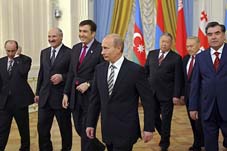Georgia leaves CIS
By Temuri Kiguradze
Tuesday, August 18

Georgia announced it would leave the CIS on August 14 2008, just after the Russian-Georgian war. “The decision on leaving the CIS was taken by the Government of Georgia after one of the CIS countries [Russia] started war against another country [Georgia] which was also a full member of the CIS, conducted the occupation of [two of] its territories and recognised the independence of these territorial units,” noted Jalagania. Under its regulations, a resignation from the CIS only comes into effect a year after the organisation is formally notified of this decision.
The Deputy Foreign Minister however underlined that despite Georgia leaving the CIS more than 70 documents it signed while a member remained legally valid. “The authorities of Georgia are ready to continue good neighbourly and mutually beneficial cooperation with all CIS states, based on the principles of respect of territorial integrity and the inviolability of borders,” concluded the Georgian Deputy Foreign Minister. The documents still in force are mostly related to visa regimes and economic relations with CIS states.
The Commonwealth of Independent States was founded in late 1991, just after the official fall of the Soviet Union. According to official CIS documents the organisation was created to “assist in the further development and strengthening of friendship, international concord, trust, understanding and mutually advantageous cooperation between the member states.” Georgia was the last former Soviet republic to join the CIS, doing so in 1993, during President Shevardnadze’s rule.
The Kremlin has already commented that “Georgia is a sovereign state and has a right to define its membership of any organisation as this is a right of any state.” The Russian Foreign Ministry’s Press Service appealed to reporters “not to dramatise” the event. However, “Georgia’s withdrawal from the CIS will negatively affect ordinary Georgian citizens,” Russian news agency ITAR-TASS quoted the Ministry as saying on August 17.
“This is one more element of Russian propaganda,” stated Georgian Deputy Foreign Minister Alexander Nalbandov in response to the statement of Russian Foreign Ministry. “If we talk about Russia it’s quite hard to imagine how our [Georgian-Russian] relations can be in a worse situation than they are now thanks to Russia. I think only another Russian military aggression could make them worse,” Nalbandov told The Messenger on August 17. “However concerning other CIS countries we can say that we have quite a good situation there, and now we will develop relations with those states on a bilateral level. I would also like to note that Georgia is a member of GUAM, an organisation which unites Georgia, Ukraine, Azerbaijan and Moldova, and is a more efficient mechanism for building relations with these countries than the CIS was. So life goes on, and I think we will have no problems in relations with our already former CIS partner countries,” concluded Nalbandov.
In October 2008 Russian Minister of Foreign Affairs Sergey Lavrov had announced that Georgia leaving the CIS would not affect the stability of the organisation. “During the last year Georgia’s participation in the work of the Commonwealth was not directed towards the consolidation of the organisation, moreover it was directed towards its erosion, so I don’t see any negative consequences in that,” stated Lavrov.
“In leaving the CIS Georgia has shown its attitude to the August war, because if Georgia would have stayed in the organisation that would have meant it supported Russia’s actions last August,” Georgian political analyst Ramaz Sakvarelidze told The Messenger on August 18. He added that the decision to leave had been made a long time ago, even before the August war, however “Georgia wanted this step to have a political meaning.” “Eventually Georgia will lose nothing by leaving the CIS as we conducted a very balanced policy in this organisation, we didn’t sign any major military documents,” stated Sakvarelidze.
Commenting on the Russian statement that ordinary Georgian citizens will be “negatively affected” by Georgia leaving the CIS the analyst noted that “if Russia considers Georgia leaving the CIS causes more damage to Georgians that Russia’s bombs this can only raise a sad smile.”
